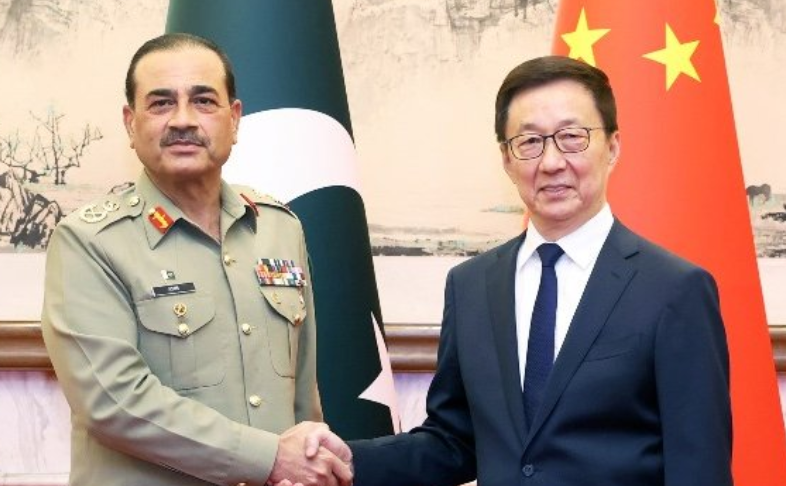Pakistan Army Chief Asim Munir meets Chinese Foreign Minister Wang Yi in Beijing amid intensified military diplomacy following Operation Zindur. Key discussions center on terrorism, protection of Chinese interests in Pakistan, and China’s direct military assistance during recent Indo-Pak hostilities.
Pakistan Army Chief Asim Munir Visits China
Pakistan’s military diplomacy appears to be in overdrive post-Operation Zindur, as the country’s Army Chief, Field Marshal Asim Munir, embarks on a multi-nation tour, with China being a pivotal stop. In Beijing, Asim Munir met with Chinese Foreign Minister Wang Yi, and the joint messaging from both sides reflects the evolving axis of strategic and military cooperation between the two nations.
Asim Munir Visits China: China reiterated its firm support for Pakistan’s ongoing efforts in combating terrorism and expressed strong confidence in Pakistan’s military capability to ensure the safety of Chinese nationals, infrastructure, and investments in the country. With Chinese interests ranging from the China-Pakistan Economic Corridor (CPEC) to dozens of industrial and energy projects, security has remained a top priority for Beijing in Pakistan.
Asim Munir Visits China:In response, Pakistan has pledged continued commitment to safeguarding Chinese citizens and assets, affirming that the military would take all necessary steps to counter terrorism and ensure Chinese enterprises operate without threat. This renewed pledge aligns with the strategic “ironclad friendship” between the two nations, a term often used to describe their ever-strengthening alliance.
Asim Munir Visits China:However, Munir’s China visit must be viewed in the broader context of Pakistan’s current geopolitical and internal political landscape. Sources indicate that Munir is on a four-nation tour that also includes Indonesia and Sri Lanka, a move seen by experts as both a military outreach and a political signal amid speculation of a possible coup or increased military influence within Pakistan’s civilian government.

Following Operation Sindoor, Pakistan’s military has been on the defensive. The Indian Armed Forces not only repelled aggression but reportedly inflicted heavy damage on Pakistani terror camps, air bases, and critical military infrastructure. This exposed vulnerabilities in Pakistan’s security apparatus, which in turn may have prompted a more proactive international outreach by its military leadership.
This visit to China, therefore, is not just about bilateral relations but also a strategic move to present Pakistan as a credible military player in South Asia. Analysts argue that this is an uphill task, especially when compared to India’s growing defense capabilities, indigenization of arms production, and increasing global interest in Indian defense platforms.
During Operation Sindoor, Indian defense officials revealed troubling details about the extent of Chinese involvement. More than 80% of the weapons and platforms used by the Pakistan Army were either provided or co-developed by China. These included heavy artillery, military-grade drones, and advanced surveillance equipment.
Even more concerning was the live intelligence support reportedly provided by China to Pakistan during the operation. According to senior Indian army officers and DGMO-level communications, Chinese satellites and vector inputs played a critical role in providing Pakistan with real-time updates about Indian troop movements and attack plans.
On May 10, during a DGMO call between India and Pakistan, the Pakistani side reportedly pleaded for a ceasefire. Their references to precise Indian attack vectors and future offensives indicated they had access to sensitive data, allegedly supplied by Chinese military channels. This development has raised serious red flags in India’s strategic community and bolstered discussions around the possibility of a two-front or even a three-front military threat in the near future.
While Munir’s diplomatic and military engagements in Beijing might appear to be routine, the broader strategic implications are far from ordinary. The visit not only underlines Pakistan’s increasing reliance on China for military and intelligence support but also reinforces Beijing’s growing influence in South Asia’s security dynamics.
For India, this alignment reiterates the urgency to bolster its border defenses, continue advancing indigenous military technology, and maintain strategic partnerships with like-minded nations in the Indo-Pacific and beyond.
As Pakistan attempts to reassert its regional standing through military diplomacy, India remains alert to the evolving threat matrix shaped by the increasingly visible China-Pakistan axis. The world watches closely as geopolitical lines harden and the battle for influence in South Asia intensifies.

